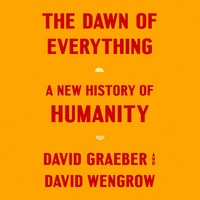Take a photo of a barcode or cover
challenging
funny
informative
slow-paced
adventurous
challenging
informative
inspiring
reflective
slow-paced
informative
inspiring
reflective
slow-paced
challenging
informative
inspiring
reflective
slow-paced
One of those books with moments so jarring and profound that you have to pause, process, and reread as you realize that things you've taken for granted as long as you can remember need a massive reassessment.
Also one of those books weighted with in this section we will, and then the section, and then in this section we have and restating it. And a truly mind bending amount of careful phrasing and attempted new terminologies. Absolutely worth it, but it doesn't make for fast and gripping reading.
Also one of those books weighted with in this section we will, and then the section, and then in this section we have and restating it. And a truly mind bending amount of careful phrasing and attempted new terminologies. Absolutely worth it, but it doesn't make for fast and gripping reading.
challenging
inspiring
slow-paced
challenging
informative
inspiring
reflective
medium-paced
This a book which seeks to ask more questions than it answers. In general things are more complex than they appear, or than we can easily conceptualise them as, and this book accepts that and happily frames most of its suggestions, findings and so on as speculative. It justifies this with the claim that they are better supported by the evidence than current prevailing, and equally speculative. lay-understanding of these topics.
With this framing in mind it's a very interesting and compelling book. Although I come from a back ground where a lot of this stuff is new to me, especially in the details, the bigger picture ideas of how history's trajectory looks were familiar to me. We are mostly familiar with the idea that agriculture comes along, allows for surplus, which leads to the inequality and 'the state'. According the Davids the prevailing questions around this accepted wisdom were surrounding why agriculture leads to inequality, and if this is a worthwhile price.
The book starts off by putting forth a strong argument against what they see as the two main conceptions of history: Hobbesian state of nature all against all, a savage harsh existence until civilisation, or Rousseauian noble savages with an idyllic egalitarian lifestyle. Neither is especially accurate and conceptions of what it means to be egalitarian will be different in different cultures anyway, depending on what those cultures value.
Anyway the book the proceeds to show how history isn't a linear progression of forms of civilisation, and to claim that a more interesting and pertinent question is not "how does agriculture lead to inequality?" but rather "how have we become stuck in a certain mode of production and governance?".
It's a compelling book which achieves what in my mind are its foremost aims: showing that humans in the past have had political agency, and suggesting that the question of why we seem to have lost it should be central to modern political and philosophical thought.
A great book especially if approached as an imaginative, question-asking project, rather than a declarative and definitive historical work.
With this framing in mind it's a very interesting and compelling book. Although I come from a back ground where a lot of this stuff is new to me, especially in the details, the bigger picture ideas of how history's trajectory looks were familiar to me. We are mostly familiar with the idea that agriculture comes along, allows for surplus, which leads to the inequality and 'the state'. According the Davids the prevailing questions around this accepted wisdom were surrounding why agriculture leads to inequality, and if this is a worthwhile price.
The book starts off by putting forth a strong argument against what they see as the two main conceptions of history: Hobbesian state of nature all against all, a savage harsh existence until civilisation, or Rousseauian noble savages with an idyllic egalitarian lifestyle. Neither is especially accurate and conceptions of what it means to be egalitarian will be different in different cultures anyway, depending on what those cultures value.
Anyway the book the proceeds to show how history isn't a linear progression of forms of civilisation, and to claim that a more interesting and pertinent question is not "how does agriculture lead to inequality?" but rather "how have we become stuck in a certain mode of production and governance?".
It's a compelling book which achieves what in my mind are its foremost aims: showing that humans in the past have had political agency, and suggesting that the question of why we seem to have lost it should be central to modern political and philosophical thought.
A great book especially if approached as an imaginative, question-asking project, rather than a declarative and definitive historical work.
adventurous
challenging
hopeful
informative
inspiring
reflective
slow-paced
challenging
informative
slow-paced
challenging
informative
medium-paced
A truly eye-opening account of Native American history and contributions to modern culture that flips the script on images of Native Americans as pre-historic, though the narrative does tend to romanticize native people in a new way. The book is especially interesting as a rejoinder to Harari's Sapiens.


